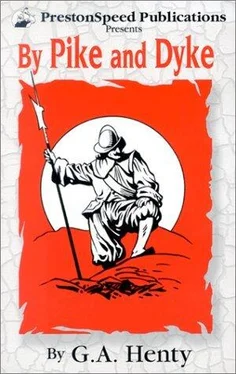G.A. Henty - By Pike and Dyke - A Tale of the Rise of the Dutch Republic
Здесь есть возможность читать онлайн «G.A. Henty - By Pike and Dyke - A Tale of the Rise of the Dutch Republic» весь текст электронной книги совершенно бесплатно (целиком полную версию без сокращений). В некоторых случаях можно слушать аудио, скачать через торрент в формате fb2 и присутствует краткое содержание. Жанр: Старинная литература, на английском языке. Описание произведения, (предисловие) а так же отзывы посетителей доступны на портале библиотеки ЛибКат.
- Название:By Pike and Dyke: A Tale of the Rise of the Dutch Republic
- Автор:
- Жанр:
- Год:неизвестен
- ISBN:нет данных
- Рейтинг книги:5 / 5. Голосов: 1
-
Избранное:Добавить в избранное
- Отзывы:
-
Ваша оценка:
- 100
- 1
- 2
- 3
- 4
- 5
By Pike and Dyke: A Tale of the Rise of the Dutch Republic: краткое содержание, описание и аннотация
Предлагаем к чтению аннотацию, описание, краткое содержание или предисловие (зависит от того, что написал сам автор книги «By Pike and Dyke: A Tale of the Rise of the Dutch Republic»). Если вы не нашли необходимую информацию о книге — напишите в комментариях, мы постараемся отыскать её.
By Pike and Dyke: A Tale of the Rise of the Dutch Republic — читать онлайн бесплатно полную книгу (весь текст) целиком
Ниже представлен текст книги, разбитый по страницам. Система сохранения места последней прочитанной страницы, позволяет с удобством читать онлайн бесплатно книгу «By Pike and Dyke: A Tale of the Rise of the Dutch Republic», без необходимости каждый раз заново искать на чём Вы остановились. Поставьте закладку, и сможете в любой момент перейти на страницу, на которой закончили чтение.
Интервал:
Закладка:
The States in January attempted to make a diversion in favour of Antwerp by attacking Bois le Duc, a town from which the Spaniards drew a large portion of their supplies. Parma, although feeling the extreme importance of this town, had been able to spare no men for its defence; and although it was strong, and its burghers notably brave and warlike, it seemed that it might be readily captured by surprise. Count Hohenlohe was entrusted with the enterprise, and with 4000 infantry and 200 cavalry advanced towards the place. Fifty men, under an officer who knew the town, hid at night near the gate, and when in the morning the portcullis was lifted, rushed in, overpowered the guard, and threw open the gate, and Hohenlohe, with his 200 troopers and 500 pikemen, entered.
These at once, instead of securing the town, scattered to plunder. It happened that forty Spanish lancers and thirty foot soldiers had come into the town the night before to form an escort for a convoy of provisions. They were about starting when the tumult broke out. As Hohenlohe's troops thought of nothing but pillage, time was given to the burghers to seize their arms; and they, with the little body of troops, fell upon the plunderers, who, at the sight of the Spanish uniforms, were seized with a panic. Hohenlohe galloped to the gate to bring in the rest of the troops; but while he was away one of its guards, although desperately wounded at its capture, crawled to the ropes which held up the portcullis and cut them with his knife. Thus those within were cut off from their friends. Many of them were killed, others threw themselves from the walls into the moat, and very few of those who had entered made their escape.
When Hohenlohe returned with 2000 fresh troops and found the gates shut in his face, he had nothing to do but to ride away, the enterprise having failed entirely through his own folly and recklessness; for it was he himself who had encouraged his followers to plunder. Had he kept them together until the main force entered, no resistance could have been offered to him, or had he when he rode out to fetch reinforcements left a guard at the gate to prevent its being shut, the town could again have been taken. Parma himself wrote to Philip acknowledging that “Had the rebels succeeded in their enterprise, I should have been compelled to have abandoned the siege of Antwerp.”
But now the winter, upon which the people in Antwerp had chiefly depended for preventing the blocking of the stream, was upon the besiegers. The great river, lashed by storms into fury, and rolling huge masses of ice up and down with the tide, beat against the piers, and constantly threatened to carry them away. But the structure was enormously strong. The piles had been driven fifty feet into the river bed, and withstood the force of the stream, and on the 25th of February the Scheldt was closed.
Parma had from the first seen that it was absolutely impossible to drive piles across the deep water between the piers, and had prepared to connect them with a bridge of boats. For this purpose he had constructed thirty-two great barges, each sixty-two feet in length, and twelve in breadth. These were moored in pairs with massive chains and anchors, the distance between each pair being twenty-two feet. All were bound together with chains and timbers and a roadway protected by a parapet of massive beams was formed across it. Each boat was turned into a fortress by the erection of solid wooden redoubts at each end, mounting heavy guns, and was manned by thirty-two soldiers and four sailors. The forts at the end of the bridge each mounted ten great guns, and twenty armed vessels with heavy pieces of artillery were moored in front of each fort. Thus the structure was defended by 170 great guns.
As an additional protection to the bridge, two heavy rafts, each 1250 feet long, composed of empty barrels, heavy timbers, ships' masts, and woodwork bound solidly together, were moored at some little distance above and below the bridge of boats. These rafts were protected by projecting beams of wood tipped with iron, to catch any vessels floating down upon them. The erection of this structure was one of the most remarkable military enterprises ever carried out.
Now that it was too late the people of Antwerp bitterly bewailed their past folly, which had permitted an enterprise that could at any moment have been interrupted to be carried to a successful issue.
But if something like despair seized the citizens at the sight of the obstacle that cut them off from all hope of succour, the feelings of the great general whose enterprise and ability had carried out the work were almost as depressed. His troops had dwindled to the mere shadow of an army, the cavalry had nearly disappeared, the garrisons in the various cities were starving, and the burghers had no food either for the soldiers or themselves.
The troops were two years behindhand in their pay. Parma had long exhausted every means of credit, and his appeals to his sovereign for money met with no response. But while in his letters to Philip he showed the feelings of despair which possessed him, he kept a smiling countenance to all else. A spy having been captured, he ordered him to be conducted over every part of the encampment. The forts and bridge were shown to him, and he was requested to count the pieces of artillery, and was then sent back to the town to inform the citizens of what he had seen.
At this moment Brussels, which had long been besieged, was starved into surrender, and Parma was reinforced by the troops who had been engaged in the siege of that city. A misfortune now befell him similar to that which the patriots had suffered at Bois le Duc. He had experienced great inconvenience from not possessing a port on the sea coast of Flanders, and consented to a proposal of La Motte, one of the most experienced of the Walloon generals, to surprise Ostend. On the night of the 29th of March, La Motte, with 2000 foot and 1200 cavalry, surprised and carried the old port of the town. Leaving an officer in charge of the position, he went back to bring up the rest of his force. In his absence the soldiers scattered to plunder. The citizens roused themselves, killed many of them, and put the rest to flight, and by the time La Motte returned with the fresh troops the panic had become so general that the enterprise had to be abandoned.
The people of Antwerp now felt that unless some decisive steps were taken their fate was sealed. A number of armed vessels sailed up from Zeeland, and, assisted by a detachment from Fort Lillo, suddenly attacked and carried Fort Liefkenshoek, which had been taken from them at the commencement of the siege, and also Fort St. Anthony lower down the river. In advancing towards the latter fort they disobeyed Sainte Aldegonde's express orders, which were that they should, after capturing Liefkenshoek, at once follow the dyke up the river to the point where it was broken near the fort at the end of the bridge, and should there instantly throw up strong works.
Had they followed out these orders they could from this point have battered the bridge, and destroyed this barrier over the river. But the delay caused by the attack on the Fort St. Anthony was fatal, for at night Parma sent a strong body of soldiers and sappers in boats from Kalloo to the broken end of the dyke, and these before morning threw up works upon the very spot where Sainte Aldegonde had intended the battery for the destruction of the bridge to be erected. Nevertheless the success was a considerable one. The possession of Lillo and Liefkenshoek restored to the patriots the command of the river to within three miles of the bridge, and enabled the Zeeland fleet to be brought up at that point.
Another blow was now meditated. There was in Antwerp an Italian named Gianobelli, a man of great science and inventive power. He had first gone to Spain to offer his inventions to Philip, but had met with such insolent neglect there that he had betaken himself in a rage to Flanders, swearing that the Spaniards should repent their treatment of him. He had laid his plans before the Council of Antwerp, and had asked from them three ships of a hundred and fifty, three hundred and fifty, and five hundred tons respectively, besides these he wanted sixty flat bottomed scows. Had this request been complied with it is certain that Parma's bridge would have been utterly destroyed; but the leading men were building a great ship or floating castle of their own design, from which they expected such great things that they christened it the End of the War. Gianobelli had warned them that this ship would certainly turn out a failure. However, they persisted, and instead of granting him the ships he wanted, only gave him two small vessels of seventy and eighty tons.
Читать дальшеИнтервал:
Закладка:
Похожие книги на «By Pike and Dyke: A Tale of the Rise of the Dutch Republic»
Представляем Вашему вниманию похожие книги на «By Pike and Dyke: A Tale of the Rise of the Dutch Republic» списком для выбора. Мы отобрали схожую по названию и смыслу литературу в надежде предоставить читателям больше вариантов отыскать новые, интересные, ещё непрочитанные произведения.
Обсуждение, отзывы о книге «By Pike and Dyke: A Tale of the Rise of the Dutch Republic» и просто собственные мнения читателей. Оставьте ваши комментарии, напишите, что Вы думаете о произведении, его смысле или главных героях. Укажите что конкретно понравилось, а что нет, и почему Вы так считаете.












